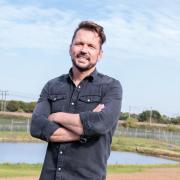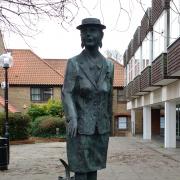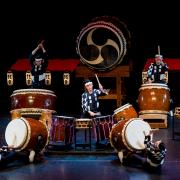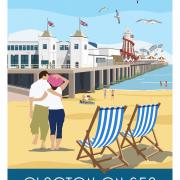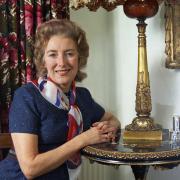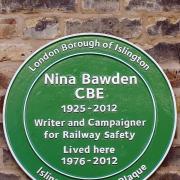Philip Beresford, author of the annual Sunday Times Rich List, turns his attentions to our county's richest and reveals those that make up our wealthiest millionaires
With the help of financial experts Philip Beresford and Rob Watts, Essex Life profiles the Essex Life Richest 50 — showcasing the 50 richest Essex entrepreneurs and the fascinating stories of how they made their millions
Our county’s entrepreneurs and business leaders have enjoyed another strong year. In fact, in this, the 13th Essex Life Richest 50 list we see record wealth, five new entries and even a brand new billionaire.
The total wealth of our 50 entries this year passes £10.9bn – a 5.7% rise on the 2015 list. You needed £55m to make the top 50 list in 2016 list, that’s up from £48m the year before, while West Ham boss David Sullivan is the man who raises our billionaire count to three.
But perhaps the most striking aspect of the 50 names that follow are just how many of these fortunes are self made by people who often came from very humble of backgrounds. Just four of our names in this year’s list inherited their money. That is the lowest proportion in a regional list of this kind since our compiler began examining the wealth of Britain’s richest people nearly 30 years ago.
Many people know Lord Alan Sugar, who again tops our list after another stunning year riding the London property boom, started out shifting car aerials from the back of a van. But did you know the Essex billionaire behind the Regus office group began his life in business selling peat from a wheelbarrow? Or that the pharmaceutical entrepreneurs Vijay and Bhikhu Patel landed in Britain from Uganda with just a few O-levels and £5 in their pockets?
Then there’s Alfie Best, who left school at 12 and now owns 44 trailer parks. For a recent BBC documentary he gave the presenter Anne Robinson a tour of some of his assets, in his helicopter. In fact, many of our entrepreneurs had intriguing first careers before turning their energies to business. Steel magnate Bill Ives was a boxer. Mark Burnett, the reality TV mogul, served as a paratrooper in the Falklands War. Simon Dolan was a kick boxing champion until he became a serial entrepreneur now worth at least £140m.
So there’s more than a whiff of truth in the idea that Essex is a county with go-getters who strive to forge their own futures. And we find this entrepreneurial wizardry across the county, with no one town dominating our list. There are four entries from both Epping and Rainham, three from Colchester and two each from Basildon, Maldon, Grays and Loughton.
We also have more than our fair share of glamour. David Beckham and his Harlow-born wife Victoria continue to march up our list. Meanwhile, a new album by Epping Forest resident Rod Stewart managed to outsell those by younger musicians, such as Noel Gallagher and Florence and the Machine.
Ray Stephens has built a business worth £68m supplying high precision parts to the aviation industry, while new entry Gene Willson has seen the value of his airline ferrying footballers and rock stars climb nicely. Both are based at Stansted.
We watch with interest what effect Brexit will have for the fortunes of the county’s wealthiest people next year, but as a group of people with track records of fighting adversity and grasping opportunities, you may think twice before betting against our entrepreneurs and business leaders.
How the list is created
To qualify for the Essex Life Richest 50 list is no simple matter. Members of the 50 must either work, live or be born in the area or have a substantial presence in the area. Their wealth is assessed on land holdings, shares in quoted or private companies and any sale proceeds from company sales. Quoted company stakes were valued at the end of August 2016. Private companies are generally valued at about ten times their latest profit figures depending on the financial health of the operation. We have no access to detailed personal financial records, such as bank accounts or the like, so make no allowance for these.
1. Lord Alan Sugar Property 2016: £1,150m 2015: £1,040m
He may be nearing his 70th birthday, but Lord Sugar is as busy as ever. His biggest property development to date is nearing completion and the 12th series of his hugely successful reality TV show The Apprentice has just hit our screens. Crosspoint, in the centre of the City of London, will have 41,500sq ft of top of the range office space and 8,100sq ft of retail space.
More London property projects are in the pipeline, with two buildings in Shoreditch and another in Clerkenwell bought for £64m over the past few years. The savvy, Chigwell-based tycoon has a track record of earning well from his properties. He sold London’s Haymarket to Qatari investors for £65m after he bought it for £31.5m just two years before. He had previously made £50m from turning around a Mayfair tower block in five years. And yet to many people this son of a Hackney tailor is best known for the Amstrad consumer electronics operation he founded in his early 20s.
He should have made around £36m personally from the £125m sale of Amstrad in 2007 and after chairing Premiership football club Tottenham Hotspur from 1991 to 2001, he picked up at least £25m for his stake at the North London club. An inspirational business leader to many, he was appointed as David Cameron’s enterprise tsar after serving in a similar role for Labour. However, Theresa May, who took exception to what she called the peer’s, ‘old fashioned views on women in the workplace’ some years ago, is to look for a new person to perform this role. He also recently obliged The Daily Mail to pay him £20,000 damages for describing him as a ‘spiv’ – handing the cheque straight to Great Ormond’s Street Hospital.
Such slights will be water of a duck’s back for Lord Sugar. His main property company, Amshold, showed £627m of assets in 2014-15 and paid out dividends of £9m. With £150m of cash and other personal property assets, he is now worth at least £1,150m.
2. David Sullivan Property and football 2016: £1,035m 2015: £850m
It seemed like a dream come true when West Ham United FC took over the former Olympic stadium in Stratford for the start of the 2016-17 campaign. But crowd trouble at the re-named London Stadium in early home games, with fans refusing to sit down and rival fans clashing after breaching the segregation area, have turned the dream into a potential nightmare. For Theydon Bois based David Sullivan, it will be particularly galling.
He has joined the ranks of Britain’s billionaires in the past year off the back of being co-chairman of West Ham United with a 51% stake in the club. The Cardiff-born magnate has also shown himself to be an artful property investor in recent years. We now see more than £480m of net assets in his three major property companies – a rise of £70m in one year. Football clubs are notoriously difficult to value, but Forbes has opted for a value of £365m for West Ham, putting Sullivan’s stake at around £186m. Asset sales such as the £50m from Sports Newspapers in 2007, a £100m pension pot and £160m of recent property deals comfortably elevate Sullivan to billionaire status.
3. Mark Dixon Property 2016: £1,020m 2015: £1,020m
Mark Dixon’s Regus is the world’s largest provider of flexible workspaces and serviced offices in 2,800 locations in more than 1,000 towns and cities across 107 countries. Dixon, the son of a Ford car mechanic, has had another good year – with operating profits in the first half of 2016 rising 30% to £90m. But he began his entrepreneurial career modestly: selling peat from a wheelbarrow. After leaving Rainsford Comprehensive School at 16, he set up a sandwich business Dial-A-Snack in 1976.
This did not flourish and so he travelled the world, working his passage around Europe, Asia and Australia, picking up jobs from iron mining to bar work. On his return, Dixon invested £600 in a burger van on London’s North Circular Road. With the proceeds, along with his savings, he bought other vans but struggled to get enough bread rolls for the business – so he set up his own bread company supplying fast-food vendors. He later sold this business for £800,000. Having relocated to Brussels he noticed how business people held meetings in cafes. So in 1989, he was inspired to set up Regus, providing offices with social and meeting spaces.
The concept worked and he floated the business in 2000. It is now valued at nearly £2.7bn, having recovered from a post-Brexit hit to its share price. Dixon’s stake is now worth £845m. With nearly £100m of share sales, some £65m of dividends since 2008 and other assets, including the Chateau de Berne vineyard in Provence and a five-star 25-room hotel, Dixon is easily worth £1.02bn.
4. Vijay & Bhikhu Patel Pharmaceuticals 2016: £675m 2015: £610m
Vijay and Bhikhu Patel arrived in Britain in the 1960s with just £5, a handful of O Levels and a hunger to succeed. In the early days, Vijay saved up money to go to pharmacy college by working in a chip shop in Wembley and in 1975 he purchased his first pharmacy in Essex. Bhikhu trained as an architect and came in to the business in 1984, a few years after Vijay established Waymade to distribute and market pharmaceutical products and prescription medicines.
In 2002 they spun out Amdipharm which picked up molecules that were out of patent and held no special value for their multinational drug firm owners. Ten years later they sold it for £367m, retaining a £90m shareholding. Another Patel company, Marlborough Pharmaceuticals, is doing well with a £4.5m profit on £7.4m sales in 2014-15. They also made a substantial sum from last year’s sale of AMCO, a niche pharma company, for £2.3bn. We put the Patels at £675m.
5. Sir Jack Petchey Property 2016: £550m 2015: £550m
Knighted in the 2016 New Year Honours for services to young people in East London and Essex through the Jack Petchey Foundation, Petchey followed that by marrying the royal sculptress, Frances Segelman in February. Now 90, Petchey has built a hefty property empire through his Petchey Holdings with a commercial portfolio worth more than £500m.
Petchey first earned money running errands before working after the war as a taxi driver. Using his £39 Army gratuity, he built a fleet of taxis. He later expanded into used cars, property and timeshare. In 2006 and 2007, Chigwell-based Petchey sold around £225m of stakes in six companies. Further sales in 2013 netted Petchey more than £50m. He plans to give the bulk of his fortune to charity through his foundation, which gives away £7m annually to supporting youth projects in London and the Home Counties. It has given away £100m so far. Despite his philanthropy, we value Petchey at £550m.
6. Patrick McKenna Media 2016: £400m 2015: £400m
An accountant and former partner, at the ripe old age of 28, with Deloitte & Touche - where he headed its media and entertainment group - Patrick McKenna later ran Andrew Lloyd Webber’s Really Useful Group until he started his Soho-based Ingenious Media operation in 1998. McKenna’s venture invested in Hollywood blockbuster movie Avatar, making about £123m. His Ingenious Asset Management operation was sold to Tilney BestInvest in early 2016 for around £43.4m. Brentwood-based McKenna had a 90% stake. In 2014-15 his main Ingenious operations made a combined profit on £5.3m. With past salaries and dividends, McKenna should be worth £400m.
7. Mark Burnett & Roma Downey Media 2016: £375m 2015: £375M
A golden Hollywood couple, Burnett and Downey’s latest work is a remake of the 1959 classic Ben-Hur. Burnett is best known as the reality TV pioneer behind hits such as Survivor, The Apprentice, Shark Tank and The Voice. His Irish actress wife is the driving force behind The Bible and other faith-based programmes. Educated at the Warren School in Romford, Burnett is a former British para and Falklands veteran.
Hollywood studio MGM spent $343m in September to take a 55% stake in the pair’s TV production company and in December they exchanged their remaining stake for £83m of MGM shares. In December last year Burnett signed a five-year contract to become president of MGM Television while Downey becomes chief content officer of the faith and family division. Past sale proceeds and the MGM stake take Burnett and Downey to £375m.
8. Bill Ives & Family Industry 2016: £365m 2015: £350m
Eastender and former boxer Bill Ives started Rainham Steel in 1973 as a new and reusable steel supplier. The Essex-based business diversified and began to focus on builders and builders’ merchants in the 1980s. The business now employs 150 staff and has a satellite sales office near Manchester and depot in Scunthorpe, Lincolnshire. Profits came in at £3.2m in 2014-15, but adding Ives’ salary to the bottom line pushes the profit to near £10m and justifies a £170m valuation. Hefty investments and property assets take Ives to £365m.
9. Ray O’ Rourke & Family Construction 2016: £300m 2015: £330m
Laing O’Rourke is the civil engineering firm behind Heathrow’s Terminal 5, the luxurious apartments at London’s One Hyde Park and many other impressive projects all over the world. County Mayo-born O’Rourke launched the business in 1978 with his brother Des. The Grays-based business was re-named Laing O’Rourke in 2001 when it acquired the construction division of John Laing.
However, these are tough times for the business, which recorded a £58m loss in 2014-15 and has embarked on a restructuring. Nevertheless, we still see £246m of assets in O’Rourke Investments Holdings (UK). Brentwood-based O’Rourke received an honorary knighthood in 2011 for services to the UK construction industry. We assume the O’Rourke family is the ultimate owner of the £270m operation and add £30m for other assets and past salaries.
10. David Beckham & Victoria Beckham Fashion and football 2016: £276m 2015: £240m
If you are looking for a spacious holiday retreat and have a spare £2.4m to hand, the Beckhams’ 200-acre French estate may be just what you’re looking for. The glamorous couple paid £1.5m for the six-bedroom Domaine Saint-Vincent mansion back in 2003 and have spent £4m over the years on its renovation. This suggests that if they get their asking price they will have still taken a £4m hit on this property. The Beckhams, however, can easily afford such a setback. David’s 21-year football career ended in 2013 with Paris St Germain, after a ten-year spell with Manchester United and a four-year deal with Real Madrid.
A five-year contract with LA Galaxy, where he was by far the highest-paid player in Major League Soccer, netted the star midfielder £4m a year. But his on-field work represented a small fraction of his overall annual earnings from grooming products and endorsements of companies as diverse as Adidas, Coty, H&M, LVS, Belstaff, Breitling, Haigh whisky and Hachette. The Beckham bandwagon is also moving into China, with a five-year deal to promote the Chinese Super League. Beckham’s company, Footwork Productions, has paid him £129m in salary and dividends from 2002 to 2014.
Forbes magazine puts his income at £188.5m in the six years from 2009 to 2014, mostly from sponsorship. Those close to him say he earned around £60m in 2015. The Beckhams bought a £2.5m house in Sawbridgeworth in 1999, the year of their marriage. They sold it in 2014 for £11.4m. The pair now live in exclusive West London in a £40m plus home. Harlow-born Victoria has made her separate fortune as a pop star with the Spice Girls and in fashion with her fashion brand. She sells in 400 top stockists around the world and won the prestigious Designer Brand of the Year title at the 2011 British Fashion Awards.
However, the accounts for Victoria’s enterprise suggested it only made a profit after the injection of funds from her husband. A new parent for the pair, Beckham Brand Holdings, saw its profits hit £15.8m on £51.4m sales in 2014. It paid out £6m in dividends to David and Victoria, while David’s own company paid a £6.5m dividend in the same year. We put the pair up to £276m this year.
11. Michael Gooch & Family Finance 2016: £250m 2015: £250m
Leigh on Sea-born Mickey Gooch trained as an accountant. He later worked for a number of blue chip American financial institutions before founding the Wall Street brokerage GFI in 1987. He floated the business on Wall Street in 2005. It was recently taken over, netting the Goochs around £185m. Other family assets add around £65m.
12. Stephen Conway & Family Property 2016: £220m 2015: £220m
Galliard Homes’ latest venture is a £750m development on the site of William Shakespeare’s former theatre called the Curtain. The 2.3 acre project in London’s Shoreditch will include a 37-storey tower with 412 apartments and penthouses as well as office space for corporate tenants.
Galliard also developed Whitehall’s Great Scotland Yard into an upmarket luxury hotel and built Baltimore Tower in Canary Wharf. The company was co-founded in 1991 by Stephen Conway. An Eastender by birth, Conway left school in 1964 aged 16, and developed his early entrepreneurial spirit through trading, working in a bank and running a market stall at weekends. ‘When I was a kid, I worked in the market running my own stall. After I left school with five O Levels, my mum wanted me to get a “proper job” paying £6 a week in a bank. But the attraction of getting £40 a week from the market on a weekend was too great to resist,’ Conway recalls.
In 1969, he began his career in industrial finance, working for the First National Finance Corporation before being poached to run a small property-lending bank until 1974. Then followed the worst property and banking crash of the century. Conway saw it first hand and learnt the lessons before going to work for a property company until he co-founded Galliard Group in 1991. Loughton-based Galliard made £43.6m profit on £116.7m sales in 2014-15. A Singaporean investor, Oxley Holdings, took a 20% stake. Despite a rise in profits, anxiety about the London property market minds us to keep Conway at £220m.
13. Gary Widdowson Industry 2016: £210m 2015: £180m
Gary Widdowson runs Kenninghall Holdings, a North London-based property group with more than £60m net assets in 2015. The business was established in 1998 and specialises in large industrial sites with long leases. Among its assets are six recycling sites and riverside wharf property in Kent. Widdowson also has a private dock on the Thames. He sold a London-based metal recycling operation in 2006 for around £120m and we can see £101.5m of net assets in eight Widdowson companies. But Epping-based Widdowson, an international showjumper in his youth, has had hefty salaries and dividends. He should easily be worth £210m with other assets.
14. Graham Peacock Petrol retailing 2016: £200m 2015: £78m
Graham Peacock has more than 40 years experience in the petrol retailing industry. Starting full time in 1968, he has worked in every part of the business and in 1997 left one company to form Malthurst, a new independent retailer, with some experienced managers in the business, including Susan Tobell as finance director. They grew Malthurst by acquisition.
A big break came in 2004 when they acquired the Q8 chain from Kuwait Petroleum, which had been losing money for years. They quickly turned it round. In 2007 the team built up by Peacock formed a new company based in Epping called MRH (GB) to run the empire. It has more than 450 forecourts operating under the Esso, Texaco, BP and Jet names. Profits shot up to £41.3m on sales of £1.78 billion in 2015. The business was taken over in early 2016 for at least £1bn. Peacock had a stake worth at least £200m.
15. Susan Tobbell Petrol retailing 2016: £200m 2015: £78m
As a director of MRH (GB), the Epping-based petrol retailer, Susan Tobbell will have made at least £200m from the February takeover of the business by a private equity business. She had more than 22.4% of the shares.
16. Vipul Thakrar & Family Rice production 2016: £191m 2015: £180m
Vipul Thakrar was expelled from Uganda by Idi Amin in 1972. After moving to the UK his family started importing basmati rice to Britain’s fast-growing Asian community. From this emerged their Rainham-based operation Tilda Rice, which was sold in early 2014 for £220m. The Thakrar family owned it all. The family is now developing the highly-regarded Dishoom chain of Indian restaurants, which made a £1m profit in 2014. Assets grew by £1m to £4.5m, valuing this business at perhaps £11m. After tax the family should be worth £191m.
----------------
17. Gordon Sanders & Family Care homes 2016: £185m 2015: £185m
A successful property developer, Sanders bought Hadleigh-based Runwood Homes for £60,000 in 1988. A decade later he sold the company’s assets and moved into care homes. Runwood, with 65 care homes, made £15.6m profit and showed nearly £172m net assets in 2015. The Sanders family should now be worth £185m with other assets.
18. Nigel Morris Finance 2016: £180m 2015: £180m
Billericay-born Nigel Morris is now based in Virginia, in the United States. He was hired by a bank to implement its information-based strategy in 1988. Out of this emerged the Capital One credit card giant. Morris retired from Capital One in 2004 having sold £136m worth of shares. He is now managing partner of the investment group QED Partners, which recently poured money into the UK student lending company Future Finance. Morris also chairs Borro, a lender offering entrepreneurs and wealthy individuals loans against collateral of luxury personal assets. And he has backed Prosper.com, an online loans company. Other assets keep Morris at £180m.
19. Alfie Best Leisure 2016: £160m 2015: £160m
Alfie Best left school at 12 but now owns 44 trailer parks. His Grays-based Wyldecrest Parks has added 14 parks to its portfolio just in the last year. Best’s property empire includes the £12m Hertfordshire estate where he lives, but his expenses do not extend to a cleaner for the seven-bedroom house because his wife likes to take care of the chores. His main company, Best Holdings, showed £49m of net assets in 2015. Other wealth and private property take Best to £160m.
19 (20). Sir Keith Mills Loyalty programmes 2016: £160m 2015: £160m
Avid sailor Sir Keith Mills is looking for investors to build a world-class sailing centre in Portsmouth. This is his latest venture in the sporting arena, having previously organised the Invictus Games. He was also deputy chairman on the organising committee for the London Olympics. Born in Brentwood, Mills made his money from loyalty cards - first Air Miles, taken over by BA in 1994, and later the Nectar card, which he sold in 2007 netting £160m. He has settled a claim against Coutts Bank where he had £73m of his wealth tied up in AIG Bonds, and had been seeking £8m in damages. His other assets include around £2m of company assets and a recent £2.5m investment in video messaging app Wordea. We value Mills at £160m for now.
19 (21). Brendan O’Malley & Family Construction 2016: £160m 2015: £100m
Woodford Green-based Mullaley Group still has faith in the London housing market despite the Brexit vote. Established in 1972 by the O’Malley family, Mullaley works largely with public-sector clients across London and south east England. Its future workload worth £785m includes new housing developments in north and eastern London. Its varied projects have included refurbishing houses as part of the government’s Decent Homes initiative and constructing new schools. In 2015-16 its profits hit £24.2m on £187.8m sales while its assets rose comfortably to £94.2m. The £160m operation is owned by O’Malley and his family.
19 (22). Jamie & Juliette Oliver Media and restaurants 2016: £160m 2015: £200m
The cheeky celebrity chef is feeling the heat. Just before Christmas, Oliver closed his Recipease shop in Notting Hill, making more than 40 staff redundant. Brighton and Clapham branches of the same chain have already closed. Jamie Oliver Holdings, the publishing-to-TV arm of his business empire, made a loss of £11.1m on sales of £40m in 2014, with net assets falling from £29.3m to £6.3m.
Jamie’s Italian Ltd, his restaurant company, also had a harder year. Profits fell from £5.6m to £3.9m in 2014-15. Starting to cook at the age of eight in his parents’ pub in Clavering, the young Oliver enrolled at Westminster Catering College after school and during the summer worked at The Starr restaurant in Great Dunmow. Fresh from college, he earned his stripes at Antonio Carluccio’s trendy Neal Street restaurant in Covent Garden and quickly moved on to become assistant chef at London’s River Cafe where he was spotted by a TV producer filming a documentary there.
A string of cook books and TV programmes followed. By 2012 he had shifted 10m books worth £126m. Assets of his wife Jools’ business interests in her Jools Enterprises grew to £248,000 in 2014. We clip the Olivers to £160m.
19 (23). Rod Stewart Music 2016: £160m 2015: £150m
Rod Stewart put his Epping mansion, Wood House, on the market in the summer of 2016 with a £7.5m price tag. He bought Wood House, once owned by Sir Winston Churchill, for £1.2m after spotting an advertisement in Country Life. He said he was going to, ‘live here for the rest of my life’.
He may not be doing that, but Essex still has a strong pull for the 71-year old rocker. He is renovating his other Essex mansion, 18th century Dorrington House near Epping Forest, which he bought for £4.65m in 2013. Among his improvements is a five-a-side football pitch, although the local council vetoed floodlights. He can certainly afford a sizeable property empire. His 2015 album Another Country outsold new records by Noel Gallagher and Florence & the Machine, becoming the UK’s 16th best-selling album of the year.
There were also 45 live shows during the year, including 17 shows in Las Vegas, 11 in Australia and New Zealand and three in Rio de Janeiro. His manager of 33 years, Arnold Stiefel, revealed in 2015 that the previous five years were the highest grossing period of Stewart’s career so far. A busy schedule in 2016 included 10 European dates in early summer and eight shows at UK football grounds. Aside from his Essex properties, Stewart owns a mansion in Beverly Hills and a collection of Victorian paintings.
Stewart admitted to Piers Morgan on television in 2010 that he was then worth over £100m. Our rock expert reckons that after all Stewart’s recent activity he should be worth £160m now. Stewart told Billboard magazine in October last year that he had no retirement in mind, adding that he will, ‘quietly disappear over the horizon,’ when, ‘the great, marvellous public decide they don’t want to pay for tickets to see my concerts or buy my albums’. There is no hint of that happening
24. Sir Jonathan Ive Computer design 2016: £152m 2015: £150m
Sir Jonathan Ive is the designer in chief at Apple, responsible for best-sellers such as the iPods, iPhones and iPads. Born in Chingford, the ex-Newcastle Poly industrial design graduate was lured to California in 1992 and five years later was promoted to become the company’s design chief at just 29. Knighted in 2012, he was last year moved away from a management role to become the firm’s first Chief Design Officer. The new position is intended to give Ive more time to concentrate on products and travel more. Salaries, stock options and property assets, including a £10m San Francisco home, should easily take Ive to £152m after tax.
25. Simon Dolan Business services 2016: £140m 2015: £140m
Former kickboxing champion Simon Dolan started his career as an entrepreneur selling eggs and cheese in Chelmsford market. Now a serial entrepreneur, Dolan has interests ranging from accountancy, employment services, motor racing, publishing and even an airline. His parent company, Hemel Hempstead-based SJD Group, was sold in September 2014 for £80m. He has become enthused by motor racing and created his own team Jota Sport in 2011, which won the 24 hour Le Mans race three years later. His past salaries, car collection and property interests take Dolan to £140m.
26. Andrew Hill & Family Construction 2016: £138m 2015: £113m
Hill Partnerships is working on developments covering all spectrums of the booming London and south eastern housing market. In recent times it has built houses costing up to £4m in Esher and yet is also working on regeneration of tired housing estates. Formed in 1999, Hill Partnerships is run by Andrew Hill, who with his family and trusts owns most of the company. Hill Holdings, its Waltham Abbey-based parent company, made £30.7m profit on £303.8m sales in 2015. With a strong balance sheet and £72.4m net assets, it is worth at least £180m. The Hill family stake is worth £135m. Other assets add £3m.
27. Derek Hood & Family Classic cars 2016: £120m 2015: £100m
An Italian private equity business recently bought a majority stake in Derek Hood’s JD Classics operation in Maldon. The terms were not disclosed but the buyer, Charme Capital, typically snaps up companies only valued at above £100m. JD Classics specialises in restoring and preparing classic racing cars, especially Jaguars. It also provides customers with JD race team specialists to support their cars in European and worldwide race events.
Hood trained as a dentist but after he began restoring classic cars as a hobby, he quickly found there was strong demand for his services and that he could turn his pastime into a business. He gave up teeth and since 1987 has been running JD Classics. Hood has also launched Jaguar Heritage Racing Trust on behalf of Jaguar Cars, which gives full race preparation and support for Jaguar’s Cars’ historic fleet of vehicles. In 2014-15 JD Classics saw its profit soar to £17.2m on £100.6m sales. We reckon it should have been worth at least £150m to Charme. Hood will retain a minority stake and allowing for tax, should be worth £120m.
28. Lord Philip Harris Retailing 2016: £110m 2015: £110m
Lord Harris took over his father’s carpet business at the age of 15 after his father’s death. He sold this business, which had become Harris Queensway, in 1988 netting £69m. But the peer is better known for Carpetright, which he founded soon after. When he stood down as chairman of the Thurrock-based business in 2014 after 57 years in the trade, Carpetright had more than 600 shops and annual sales of nearly half a billion pounds. He netted share sales of at least £50m from Carpetright over the years. The Harris family is worth around £110m, but he would have been much richer were it not for his charitable work, which includes the Harris Federation of 37 school academies.
29. David Wernick & Family Construction 2016: £110m 2015: £110m
From modest beginnings in 1935 making buildings for the farming industry, the Wickford-based Wernick Group is now one of the largest builders and hirers of wooden and modular buildings. Under Wernick, its chief executive, the group is worth £110m on the back of a record £12.8m profit and £71.5m net assets in 2015. The wider Wernick family is worth £120m with other assets.
30. Graham & Richard Cherry Construction 2016: £100m New entry
Chartered surveyor and estate agent Alan Cherry founded Brentwood-based Countryside Properties in 1958. It floated on the stock market in 1972, Cherry remaining as chairman until his death in 2010. His sons Graham and Richard joined the board in 1984 and 1986 respectively. The business was taken private in 2005. It was largely taken over by a private equity group in 2013, though the Cherry family are still shareholders and involved in running the business. The brothers have 35.35m shares in Countryside, which floated again on the stock market in February 2016. That stake is now worth around £83m. Proceeds from previous sales and other shares in trust, plus Stonebond, a property operation with £4.2m net assets, easily take the family to £100m.
31. Daniel Watts & Family Property 2016: £95m 2015: £95m
Danny Watts’s vision was to transform a 20-acre site on the outskirts of Colchester into a gateway community for the Essex town, where hundreds of people could work, shop, meet and relax. Since the 1980s the Watts family’s Tollgate Partnership has delivered a shopping centre, business park, Sainsbury’s superstore, new roads and improved access for pedestrians and cyclists. Today the business is run by the second generation, Jayne Gee and Daniel Watts. The business showed net assets of £95.2m in 2014-15.
32. Paul & Helena Jeffery Care homes 2016: £87m 2015: £124m
Colchester-based Myriad Group made a £1.4m profit on £161.5m turnover in 2014-15, but it has nearly £112m net assets. The business, trading as Caring Homes, is regarded as one of the leading independent care home groups in the UK. It was founded in 1994 by mother and son team Helena and Paul Jeffery. She is a trained nurse and serves as nursing director, while Paul runs the group with his background as a chartered accountant. It operates more than 143 homes for the elderly or severely disabled, with 3,000 residents in total. The Jeffreys have a stake worth £83m. Other assets take the pair to £87m.
33. Avnish Goyal & Family Care homes 2016: £85m 2015: £55m
After training as an accountant with PriceWaterhouseCoopers, Avnish Goyal decided not to enter the profession. He went into property instead, working with his parent’s property portfolio. His parents-in-law, both doctors, had built a care home and he saw that this could be a profitable business. In 1997 he launched Billericay-based Hallmark Healthcare, with its first 44-bed home, costing £850,000. Today it operates 17 care homes and has been rebalancing its portfolio to concentrate on South Wales and the south and eastern part of England. In 2014-15 Hallmark’s profits soared to £14.8m on £53.6m sales. Some £6.8m of the profit came from the sale of three homes. The £80m operation is owned by the Goyal family. Other assets take the Goyals to £85m.
33 (34). Rabinder Rai & Family Care homes 2016: £85m 2015: £55m
Ranc Care Homes, the Ilford-based residential care home provider, was founded in 1988 by Rabinder Rai. The business now has more than 1,000 staff and operates 11 care homes across Bedfordshire, Cambridgeshire, Essex and Kent. They provide 850 beds for the elderly and physically disabled. In 2014-15 its parent showed £82m net assets and the group is easily worth that sum. Past dividends take Rai and his family to £85m.
33 (35). Kevin Taylor Construction 2016: £85m 2015: £85m
McLaren Construction PLC has built offices and plants for Rolls Royce, Aviva, Sky News and a host of other big names here in the UK and in the Middle East. Kevin Taylor, a quantity surveyor by training, started the business from his home around the year 2000. The box for the company fax machines served as his first desk, with his dining room turned into the boardroom. The Brentwood-based business made a loss of more than £15m in 2015, but still has assets of £25.4m. Taylor blamed a series of legacy contracts for the difficult year, so we only clip the business’s value by £10m to £50m. We add another £25m for past salaries
36. Christopher Johnson & Family Industry 2016: £83m 2015: £83m
Allan Johnson’s Castledon business saw its profits slip to £7.8m despite record sales of £76.8m in 2015. Johnson was working at Southend Airport when he noticed pilots were taking time off due to back and leg problems caused by uncomfortable sitting positions on long flights. He was inspired to design a seat with adjustable lumbar and leg support.
The entrepreneur set up IPE (Industrial Precision Equipment) to manufacture the seats for pilots, co-pilots, navigators and engineers in 1961. The company’s big break was in persuading Lufthansa, the German airline, to specify Ipeco seats in the mid-1970s, after which orders from Boeing began to roll in. Today the business, still based at Southend Airport, is run by Allan’s son, Christopher. With more than £56.7m net assets, it is still an £80m operation. We add £3m to the Johnson family for other assets and past dividends and salaries.
36 (37). Dennis Myers & Family Finance 2016: £83m 2015: £82m
Dennis Myers made his fortune by starting, building up and selling Swift Advances, a mortgage and consumer credit lender. The private equity group, Alchemy partners, bought the business for £100m back in 2004. With his family trusts, he owned all the shares. We value the Myers family at £83m, allowing for tax, past salaries and a property company with £2.5m of net assets.
38. Tim & David Sargeant and Family Construction 2016: £80m 2015: £50m
Tim and David Sargeant run the highly-regarded property developer City & Country, which dates back to 1962. The Stansted-based group concentrates on sensitively turning hospitals and other historic buildings into high-quality homes. The family-owned operation saw its profits soar to £13.3m on £51.5m sales in 2014-15. With £37.5m net assets, it is an £80m operation.
38 (39). Frank Van Wezel Industry 2016: £80m 2015: £80m
Frank Van Wezel founded his Hi-Tec sports footwear business in the appropriately named Shoeburyness. That was back in 1974 and the firm soon became well known for its squash and tennis shoes, later branching out into trainers as Britain’s running boom took off in the 1980s. Hi-Tec shoes have sold well in the US and today their wares are bought in 85 countries around the world. The UK company, now run by Franz’s son Ed, should easily be worth its £66.2m net assets. Van Wezel is a director of League One football club Southend United, which won promotion via the play-offs in May. In all the Dutchman should easily be worth £80m.
40. Barry Hearn & Family Leisure, sports and media 2016: £78m 2015: £48m
Romford-based Barry Hearn is an East End boy from a council estate whose mother was a cleaner and dad a London bus driver. He trained as an accountant and became the youngest ever chartered accountant to become a member of the institute. Hearn later worked for a large firm where one of his biggest clients was Deryck Healy International, a textile design company. In 1973, he persuaded the firm that it needed a full-time finance director. Overnight he had doubled his salary.
One of his briefs at Healy was to look at possible acquisitions, so he took the company into snooker, buying the Lucania chain of snooker halls for £500,000 in 1974. It was such a good investment that he put his own money into it. When Healy sold it in 1982 for more than £3.5m, Hearn owned a third of it. He invested his cut and in June 1982 he left Healy and formed his own company called Matchroom. He soon had a Romford snooker hall, a fruit-machine and pool-table business in the East End, and some offices.
That was when the best snooker player the world had yet produced, Steve Davis, simply walked in off the street. Since then Hearn has dominated snooker, overseeing its extraordinary leap as it became established as Britain’s favourite television sport. He managed the best players, organised many of the top tournaments and sold them to television. He took 20% of his players’ income, but re-invested heavily in the sport.
He also branched out into boxing, pool, bowling, golf, fishing, poker and darts, giving the latter a much-needed injection of razzmatazz. Matchroom, owned by Hearn and his family, saw its profits soar in 2014-15 to £9.2m on £34.3m sales. It is worth £70m. With his other assets, Hearn is easily worth £78m.
41. Iain Liddell Business services 2016: £70m 2015: £68m
Ian Liddell worked for a leading shipping line and after gaining experience of the container trade, he hatched the idea of setting up his own freight service operation the day before his 21st birthday in June 1984. Today, over 30 years later, Uniserve is the largest freight service provider in the UK with more than 500 staff. The Tilbury-based operation is entirely owned by Liddell. In 2014-15 it made £4.9m profit on £164m sales. With £66.4m net assets it is worth £70m. We add £3.6m for past salaries, dividends and other assets to Liddell.
41 (42). Ray Stephens & Family Industry 2016: £70m 2015: £66m
Ray Stephens is chairman of Swan Investments Group, a Stansted-based industrial holding company founded in 1983. It makes precision engineering components for the aviation industry and trades under the Inflite name. Stephens and his family own at least 97% of the shares. In 2014-15, Swan made a £1.3m profit on sales of £64.3m. It should be worth its near £68m net assets. With other smaller businesses, the Stephens family is worth £70m after-tax and spending.
41 (43). Gene Willson 26/10/1950 Aviation 2016: £70m 2015: £65m
Stansted-based Titan Airways saw its profits climb nicely to £6m on £77.6m sales in 2015-16. The company is run and largely owned by Gene Willson, a qualified pilot. Titan charters planes to a range of clients. It also owns Satellite Travel Group. Willson runs and largely owns about half the company. This business’s revenue comes from transporting mail and freight, while Titan also operates a variety of charters. Recent passengers have included Premiership and national football teams, rock groups and even royalty. With nearly £35m net assets, Titan is worth £65m. Willson owns all but one special share. Dividends, including £4m in the past year, take him to £70m.
44. Peter Cooper Construction 2016: £65m New entry
Founded in 1984, Hockley-based Seetec Business Technology Centre is one of the country’s top training companies. In 2014-15 Seetec saw its profits hit £10.9m on £80.7m sales. It should easily be worth £75m on these figures. Peter Cooper, the managing director, has an 80% stake worth £60m. Other assets should add £5m.
44 (45). Harry & Sukhjit Dulai and Family Food, hotels and property 2016: £65m New entry
Harwich-based Flying Trade Group operates a series of food, hotel and property businesses. The seeds of this diverse empire were sown by Kewal Dulai, who came to Britain from India in 1971. Dulai founded Surya Foods, which provides global foods to Tesco, Asda, J Sainsbury and Morrisons. Harry Dulai and Suki Dulai, Kewal’s sons, are managing director and chief executive of Surya today. Sales exceeded £100m in 2015, with profits slipping slightly to £7.2m. The business’s assets rose to £30.9m. We value the business at the family at £65m
46. Philip Setter Retailing 2016: £60m New entry
Philip Setter owns Basildon-based Whitehouse Leisure, which distributes plush soft toys for children. The business specialises in licensed merchandise associated with the Star Wars, Disney and Jurassic Park film franchises. In 2015 the company made £7.7m profit on £49.3m sales and should be worth £60m
46 (47). Paul Smith & Family Estate agency 2016: £60m 2015: £60m
Paul Smith co-founded Colchester-based Spicerhaart as a three-branch estate agency in East Anglia in 1989 with his father. 27 years later, it operates seven well-known estate agencies in England including Haart, Spicer McColl, Haybrook, Felicity J Lord, Chewton Rose and Darlows in Wales. It also has an alternative to high street estate agencies through iSold.com. Profits at Spicerhaart Group hit £5m on £117m sales in 2014. With £22m net assets it is worth £60m. Smith and his family own it all
48. Richard Higgins & Family Construction 2016: £56m 2015: £55m
The Loughton-based Higgins Group saw its profits jump sharply to £4.5m on a record £226m turnover in 2014-15. It has been particularly successful in the London market, delivering a key regeneration project on a Lambeth estate. The group was founded in 1960 by the late Derek Higgins who died in 2004. His three sons are directors, led by the eldest, Richard, who is chairman and here representing the family as a whole. We value the company on its £49.5m net assets, adding £6.5m for other assets to the Higgins family.
49. John Hall Construction 2016: £55m New entry
John F Hunt has safely demolished many large buildings, including city tower blocks, the former MI5 building and the old Cardiff Arms Park. The Grays-based business was established in 1982 and now employs more than 300 people across six sites. The business also specialises in stone masonry, asbestos removal and housebuilding. Profits came in at £7.5m on £84.4m sales in 2015-16. There are assets of £11m, with Hall and his family owning all of the £50m operation. A separate operation hiring machinery and other assets add £5m
49 (50). Clive & Steve Osbourne & Family Salt production 2016: £55m 2015: £55m
Steve Osborne, the managing director of the Maldon Crystal Salt Company, has a lot to thank Delia Smith for. Since the TV chef and cookbook author began extolling the virtues of the Essex salt in the 1990s, it has become a store-cupboard staple in homes and restaurants worldwide. Maldon sea salt was originally harvested by the Saxons, who dug clay pits into the salt marshes of the River Blackwater to collect the water on the spring high tides.
The water was boiled in clay pots until the salt-makers were left with fine salt crystals. The Maldon Crystal Salt Company was started in 1882 and has been in the Osborne family since it was bought a century later by Steve Osborne’s great-grandfather, who also owned a dairy and a pub. His grandparents grew the business by supplying the local butchers and delicatessen and a handful of stores in London, including Harrods and Fortnum & Mason.
When Steve’s father, Clive, (now retired) took charge of the business in 1970, it was turning over about £35,000 a year. Today, turnover is £14m, though in 2013-14 it made a tasty £4.8m profit on £12.8m sales. It should be worth £50m as a very profitable niche operation. Other assets add £5m to the wider Osborne family.



